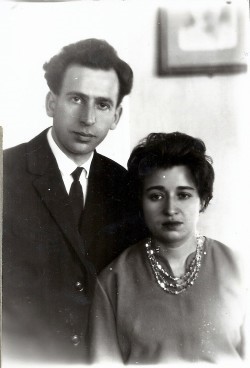Iakov Rodkin was born in 1922 in Orsha, eastern Belorussia, in the family of the photographer Berka (Boris) Rodkin. His parents divorced, and Iakov was brought up in the family of his father and his second wife Fania, a rabbi's daughter. In 1937, Iakov completed a seven-year Yiddish school and went to faraway Birobidzhan, the capital of the Jewish Autonomous Region in the Soviet Far East, to study at a technical college and then settle in the Soviet Jewish "homeland". A year later, he returned to Orsha, tired of the harsh and cold Siberian climate, and disappointed with the teaching level and the living conditions in Birobidzhan. After his homecoming, Iakov helped his father at the photo studio and studied radio technics at a local paramilitary club.
In June 1941, the Soviet-German war broke out. Orsha, being a major railway junction in Belorussia, came under heavy enemy bombardment from the first day of the war. These bombings played a major role in the Rodkin family's decision to evacuate. By the end of the summer, they reached the Chuvash Autonomous Republic, 600 kilometers (370 miles) east of Moscow, where they were settled in a kolkhoz (collective farm). Despite his urban background, Iakov took well to the agricultural labors, and the family did not starve.
However, in December 1941 Iakov was drafted into the Red Army. At the recruitment office, Iakov expressed his wish to serve as a radio operator, and he was sent to a course in communications in Eastern Siberia. Toward the end of 1942, he was attached to a Siberian division and sent to the front in the North Caucasus. Following the reorganization of his regiment, Iakov was transferred to reconnaissance, and then back to communications. In January 1943, he wrote to his parents in Chuvashia:
"... We are fighting hard against the enemy. We have liberated many localities. From January 1 until January 22, I was in the infantry, and was deployed as a scout. In one fierce battle, I found myself alone, and then I was handed a phone again. I managed to take one prisoner, a Fritz with a light machine gun. In general, luck is on my side, and I am alive and well. Tonight, German tanks suddenly appeared in our rear. I was alone uphill. They showered me with heavy fire and moved through my trench, but then they decided that there was no one up the hill and left ... ".
Five days after this optimistic letter, the commander informed Iakov's family that their son had fallen in a battle near the Bogatovo farm, in the Rostov-on-Don Region. Ironically, Iakov Rodkin was killed on his 21st birthday – January 30, 1943.







